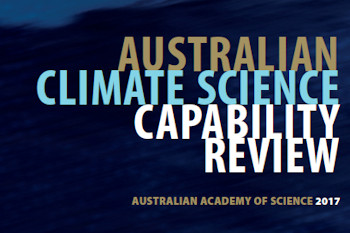
Australia can improve coordination of national climate science programs to deliver better climate information to farmers and infrastructure planners, and to guide national efforts to mitigate the future impacts of climate change, according to a review by leading scientists.
The Australian Academy of Science report recommends that government consider mechanisms to ensure better coordination of climate research across Australia’s universities and climate agencies. It also recommends increasing climate science capability in a number of critical areas, amounting to around 80 new research positions over the next four years.
The review surveyed all of Australia’s climate research agencies and centres, including the Bureau of Meteorology, the CSIRO, the Australian Antarctic Division and universities to identify how many Australian researchers are working across the various disciplines and sub-disciplines of climate science, and how well these different areas are performing.
It reports that while Australia is strong in areas such as thermodynamics and extreme weather events, there are some significant weaknesses in areas such as climate model development. This includes the Australian Community Climate and Earth System Simulator (ACCESS), micrometeorology (the branch of meteorology that deals with weather conditions on a small scale), boundary layer dynamics (the dynamics of the lowest part of the Earth’s atmosphere) and the modelling of two-way human/climate interactions.
The report found that there are around 420 dedicated climate scientists across all of Australia’s universities and research agencies, with their research providing constant improvements in weather prediction and climate models in Australia and throughout the world.
The area most in need of attention is climate modelling, where critical under-resourcing means that Australia’s climate models are failing to keep pace with world’s best practice. To address this issue, the review estimated that around 30 new climate modellers and scientists would be needed over the next four years.
Other key recommendations from the report include ensuring the work of the Antarctic Climate and Ecosystems Cooperative Research Centre is funded beyond 2019 and that a broader review of climate-related research capabilities is undertaken by the Australian Government.
© 2025 Australian Academy of Science